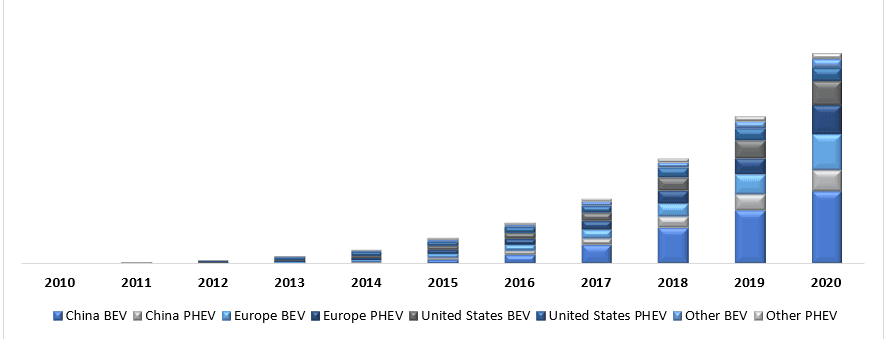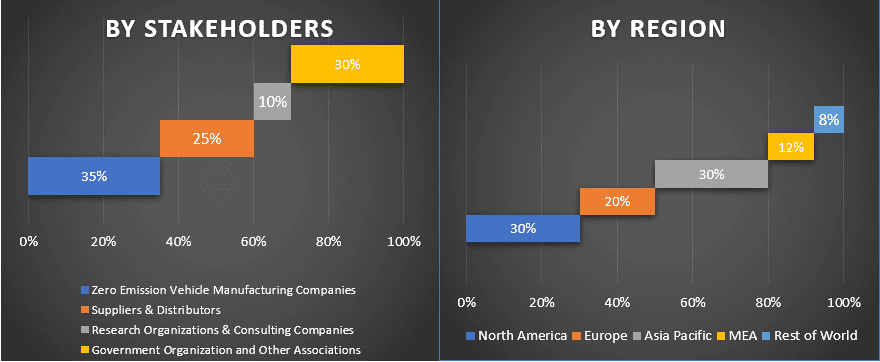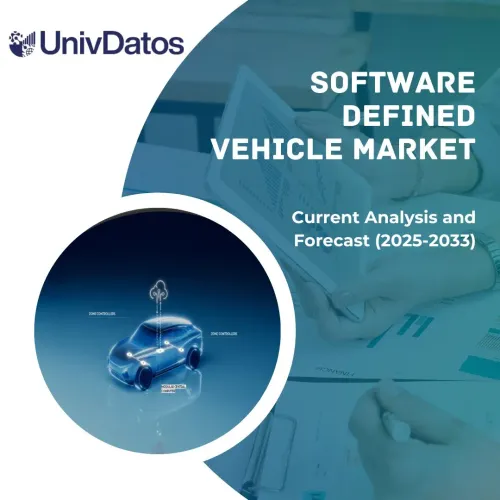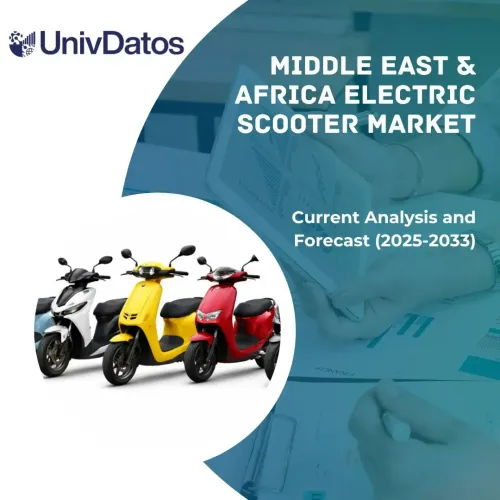- Home
- About Us
- Industry
- Services
- Reading
- Contact Us
Zero Emission Vehicle Market: Current Analysis and Forecast (2021-2027)
Emphasis on Vehicle Type (Battery Electric Vehicles (BEV), Plug-in Hybrid Electric Vehicles (PHEV), Fuel Cell Electric Vehicles (FCEV)); Application (Commercial Vehicles, Passenger Vehicles); Product Type (Buses, Trucks, Cars, Other Vehicles); and Region/Country
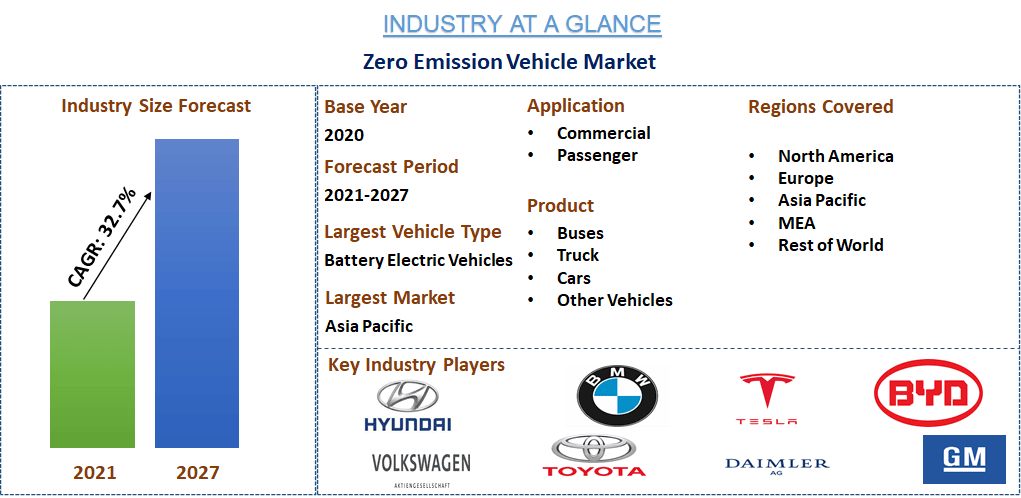
Zero Emission Vehicle Market sales stood at 7.3 million vehicles in 2019 and is anticipated to reach XX million vehicles sale by 2027 displaying a CAGR of 32.7% over the forecast period (2021-2027). A ZEV is a vehicle that has the potential to produce no tailpipe emissions. These vehicles have significant emission benefits over conventional vehicles & run-on alternate power sources such as battery electricity, natural gas, and solar power. The growth of Zero Emission Vehicle Market expanded significantly over the last decade, underpinned by supportive policies and technology advances across the world. For instance, as per IEA Only about 17 000 electric cars were on the world’s roads in 2010. By 2019, that number had swelled to 7.2 million, 47% of which were in The People’s Republic of China (“China”).
Other factors driving the growth of the Zero Emission Vehicle market globally are: improvements in battery technology and cost, more charging infrastructure being built, and new compelling models from automakers. Also, Electrification is another force which is also spreading to new segments of road transport, setting the stage for huge changes ahead. For instance, as per BCG, the global market share of electrified cars, SUVs, and other light vehicles grew from 8% in 2019 to 12% in 2020 and has shown continued strength in early 2021. This shift will accelerate dramatically in the years to come & the updated forecast predicts that by 2026 electrified vehicles will account for more than half of light vehicles sold globally.
Global Electric Passenger Car Stock, 2010-2020, (Mns)
Hyundai, Tesla, BMW, BYD Company Ltd., Daimler, Volkswagen AG, Toyota Motor Corporation, and General Motors are some of the prominent players operating in the Zero Emission Vehicle market. Several M&As along with partnerships have been undertaken by these players to facilitate customers with more models & innovative vehicles.
Insights Presented in the Report
“Amongst Vehicle Type, Battery Electric Vehicles (BEV) segment holds the major share.”
Based on the vehicle type, the Zero Emission Vehicle market is bifurcated into Battery Electric Vehicles (BEV), Plug-in Hybrid Electric Vehicles (PHEV) and Fuel Cell Electric Vehicles (FCEV). The Battery Electric Vehicles (BEV) segment dominated the market with nearly XX million vehicles sold in 2020. The segment is expected to grow at a CAGR of XX% during the forecast period to reach a XX million vehicles sale by 2027 owing to the fact that BEV models are offered in most vehicle segments in all regions. For instance, by 2030, BEVs will likely account for 81% (25.3 million) of all new EVs sold.
“Amongst Application Type, Passenger Vehicles dominated the market in 2020.”
Based on application type the market is segmented into Commercial Vehicles and Passenger Vehicles. The Passenger Vehicles segment grabbed XX% market share of the Zero Emission Vehicle Market with the XX million vehicles sale in 2020. The segment is expected to grow at a CAGR of XX% during the forecast period to reach a XX million vehicles sale by 2027 owing to the increased demand due to initiatives offered by the governments across the world. For instance, as per Bloomberg, Passenger EV sales are set to increase sharply in the next few years, rising from 3.1 million in 2020 to 14 million in 2025.
“Amongst Product Type, Cars are expected to dominate the market during the analyzed period.”
Based on product type the Zero Emission Vehicle market is bifurcated into Buses, Trucks, Cars and Other Vehicles. In 2020, the cars segment dominated the Zero Emission Vehicle Market and accounted for XX% market share. This segment will witness a considerable CAGR of XX% during the forecast period (2021-2027F) owing to the significant demand & production targets of OEMs across the world. For instance, as of 2020, Passenger cars have 4% share of EV sales with 10 M Size of fleet across the world however the same is set to expand as electric cars are gradually becoming more competitive in some countries on a total cost of ownership basis & several governments are providing or extending fiscal incentives that will buffer electric car purchases from the downturn in car markets.
“Asia Pacific represents as the largest market in the Zero Emission Vehicle market.”
For better understanding of the market penetration of Zero Emission Vehicle, the report provides a detailed analysis of major regions including North America, Europe, Asia Pacific, MEA and the rest of the world. Asia Pacific constitutes the largest market for the industry and with the sales of XX million vehicles in 2020 owing to the fact that China already accounts for 45% of EVs on road of the world which is 2.3 million & In addition, the number of schemes and incentives are provided by government to promote the growth of ZEV vehicles in different countries. However, North America is also identified as emerging markets offering significant growth opportunities for key players owing to the rapidly developing EV infrastructure.
Reasons to buy this report:
- The study includes market sizing and forecasting analysis validated by authenticated key industry experts
- The report presents a quick review of overall industry performance at one glance
- The report covers an in-depth analysis of prominent industry peers with a primary focus on key business financials, product portfolio, expansion strategies, and recent developments
- Detailed examination of drivers, restraints, key trends, and opportunities prevailing in the industry
- The study comprehensively covers the market across different segments
- Deep dive country-level analysis of the industry
Customization Options:
Zero Emission Vehicle Market can further be customized as per the requirement or any other market segment. Besides this, UMI understands that you may have your own business needs, hence feel free to connect with us to get a report that completely suits your requirements.
Table of Content
Analyzing the historical market, estimation of the current market, and forecasting the future of the Global Zero Emission Vehicle adoption were the three major steps undertaken to create and analyze the adoption of ZEV across various segments in North America, Europe, Asia Pacific, MEA & Rest of the world. Exhaustive secondary research was conducted to collect the historical market numbers and estimate the current market size. Secondly, to validate these insights, numerous findings and assumptions were taken into consideration. Moreover, exhaustive primary interviews were also conducted, with industry experts across the value chain of the Zero Emission Vehicle sector. Post assumption and validation of market numbers through primary interviews, we employed a top-down/bottom-up approach to forecast the complete market size. Thereafter, market breakdown and data triangulation methods were adopted to estimate and analyze the market size of segments and sub-segments the industry pertains to. Detailed methodology is explained below:
Analysis of Historical Market Size
Step 1: In-Depth Study of Secondary Sources:
Detail secondary study was conducted to obtain the historical market size of the Zero Emission Vehicle through company internal sources such as annual report & financial statements, performance presentations, press releases, etc., and external sources including journals, news & articles, government publications, competitor publications, sector reports, third-party database, and other credible publications.
Step 2: Market Segmentation:
After obtaining the historical market size of the Zero Emission Vehicle market, we conducted a detailed secondary analysis to gather historical market insights and share for different segments & sub-segments for major regions. Major segments included in the report as vehicle type, application type and product. Further regional & country-level analyses were conducted to evaluate the overall adoption of the Zero Emission Vehicle in the global context.
Step 3: Factor Analysis:
After acquiring the historical market size of different segments and sub-segments, we conducted a detailed factor analysis to estimate the current market size of Zero Emission Vehicle. Further, we conducted factor analysis using dependent and independent variables such as growing need for ZEV’s and government focus on clean energy targets which includes less emission vehicles expansion & promotion. A thorough analysis was conducted for demand and supply-side scenario considering top partnerships, merger and acquisition, business expansion, and product launches in the Zero Emission Vehicle industry.
Current Market Size Estimate & Forecast
Current Market Sizing: Based on actionable insights from the above 3 steps, we arrived at the current market size, key players in the Global Zero Emission Vehicle market, and market shares of the segments. All the required percentage split, and market breakdowns were determined using the above-mentioned secondary approach and were verified through primary interviews.
Estimation & Forecasting: For market estimation and forecast, weights were assigned to different factors including drivers & trends, restraints, and opportunities available for the stakeholders. After analyzing these factors, relevant forecasting techniques i.e., bottom-up approach was applied to arrive at the market forecast to 2027 for different segments and subsegments across the major regions globally. The research methodology adopted to estimate the market size encompasses:
- The industry’s market size, in terms of value (US$) and the adoption rate of Zero Emission Vehicle across the major markets
- All percentage shares, splits, and breakdowns of market segments and sub-segments
- Key players in the Zero Emission Vehicle market in terms of services offered. Also, the growth strategies adopted by these players to compete in the fast-growing market.
Market Size and Share Validation
Primary Research: In-depth interviews were conducted with the Key Opinion Leaders (KOLs) including Top Level Executives (CXO/VPs, Sales Head, Marketing Head, Operational Head, and Regional Head, Country Head, etc.) across major countries. Primary research findings were then summarized, and statistical analysis was performed to prove the stated hypothesis. Inputs from primary research were consolidated with secondary findings, hence turning information into actionable insights.
Split of Primary Participants in Different Regions
Market Engineering
Data triangulation technique was employed to complete the overall market estimation and to arrive at precise statistical numbers of each segment and sub-segment of the Global Zero Emission Vehicle market. Data was split into several segments & sub-segments post studying various parameters and trends in the areas of vehicle type, application, and product verticals.
The main objective of the Zero Emission Vehicle Market Study
The current & future market trends of Zero Emission Vehicle were pinpointed in the study. Investors can gain strategic insights to base their discretion for investments from the qualitative and quantitative analysis performed in the study. Current and future market trends determine the overall attractiveness of the market at a global & country level, providing a platform for the industrial participant to exploit the untapped market to benefit as a first-mover advantage. Other quantitative goals of the studies include:
- Analyze the current and forecast market size of Zero Emission Vehicle in terms of value (US$). Also, analyze the current and forecast market size of different segments and sub-segments
- Segments in the study include areas of vehicle type, application type, and product verticals
- Defined analysis of the regulatory framework for the Zero Emission Vehicle industry
- Analyze the value chain involved with the presence of various intermediaries, along with analyzing customer and competitor behaviors of the industry
- Analyze the current and forecast market size of the Zero Emission Vehicle for the major regions & countries
- Major regions studied in the report include North America, Europe, Asia Pacific, MEA and Rest of World
- Company profiles of the Zero Emission Vehicle market players and the growth strategies adopted by them to sustain in the fast-growing market
- Deep dive regional & country level analysis of the industry
Related Reports
Customers who bought this item also bought

